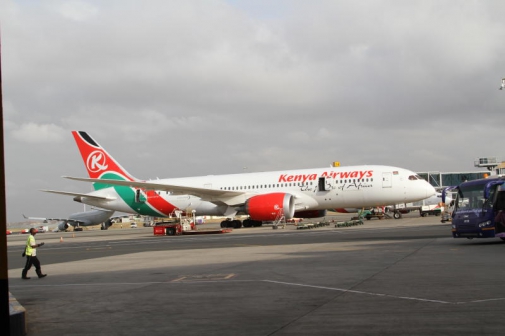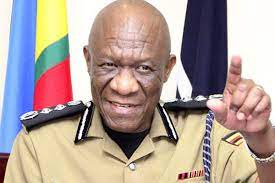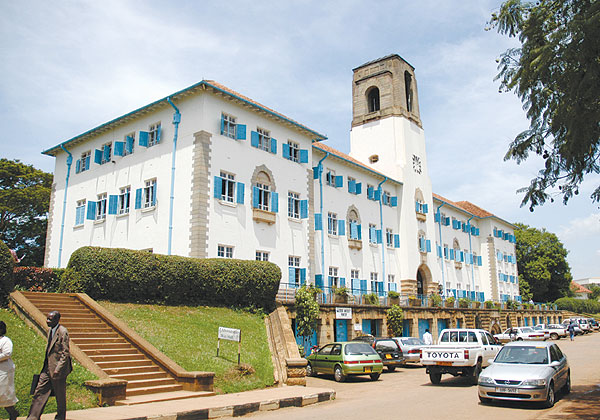It was perhaps one of the few investor briefings without investors. It was Kenya Airways’ investor briefing.
Shareholders were less interested.
Save for a few banks keen on salvaging their money from the troubled airline, other shareholders generally gave the occasion a wide berth.
But it was a big day for financial journalists.
They patiently stuck around for hours waiting for what has since become an inevitable juicy story – a widening of Kenya Airways’ losses.
There were also analysts, the queer sort interested in near-death experiences; those who have come to relish the national carrier as a specimen of corporate failure.
But it was not what the journalists and analysts would say that scared the management of Kenya Airways led by its chairman Michael Joseph and outgoing CEO Sebastian Mikosz.
At least not so much as they feared the future. It was the planes in the skies that gave them creeps.
And one particular plane landing at Jomo Kenyatta International Airport (JKIA) as the publicly listed company announced a widening of net loss to KSh8.5 billion, brought nothing but a bad omen.
It was such a tragic coincidence that Uganda Airlines, which is back, was making its maiden flight to Nairobi on a day when KQ, as Kenya Airways is popularly known by its international code, was announcing its financial mess. The symbolism was foreboding.
The stakes for survival couldn’t be higher now for KQ. Mr Mikosz could not help but remind the scribes of the impending competition, two hours after Uganda Airline’s commercial flight touched down at JKIA.
“We have typically a newcomer who is going to put more pressure on the capacity. The competition for the market share will be even bigger,” said Mikosz, noting that Kenya Airways was going to fight hard to protect its strategic hub, Nairobi.
Uganda Airline joins other regional players, including Ethiopian Airline, Rwanda’s RwandAir and Air Tanzania. All of them are loss-makers, except for Ethiopian Airline.
Besides Kenya, the airline will initially fly to Tanzania, Somalia, South Sudan, and Burundi.
All of which are KQ’s strategic regional routes.
In November, the airline plans to launch flights to destinations in south and central Africa, according to state officials.
Besides Nairobi, the airline also made successful trips to Juba, Mogadishu and Dar es Salaam.
The airline might not have started with a bang, but analysts reckon that with a little efficiency, it can certainly eat into Kenya Airways’ traffic.
Already, the Government of Uganda has directed that all State employees to use the national carrier.
The airline is offering KSh27,800 for a return ticket from Entebbe to Nairobi, cheaper than even Jambojet, a budget carrier, which charges KSh28,190 on average for a round trip.
Kenya Airways will be charging an average KSh54,000 on August 28 on the same route.
After the Uganda Airline made its maiden flight to Juba International Airport on Wednesday, South Sudanese were ecstatic. Uganda has deeper diplomatic and trade relations with South Sudan.
“When we were told Uganda Airlines was seeking permission to fly here, we just accepted and agreed it would not take even an hour to approve it,” Kur Kuol, the General Manager of Juba Airport was quoted by a local daily.
KQ also flies from Nairobi to Juba, South Sudan’s capital city.
It is not just Uganda Airline that has been giving KQ a run for its money.
Air Tanzania, Tanzania’s national carrier, has also in recent times been aggressively snapping up more routes as the battle to conquer the East African skies intensifies.
Ethiopian Airline, the only profitable airline, in the region, has continued to brow-beat Kenya Airways.
In the first half of this year, Kenya Airways also lost some routes, for example after Jetways shut down, it went down with KQ’s traffic to India as the latter was its entry point to India.
Also during this time, the airline experienced a lot of delays and cancellations which the management attributed to a much higher number of operations.
It attributed the loss—and the increased revenues as well—to increased flights, especially the one in New York.
Super expensive
Generally, the airline business is, by and large, a loss-making business. There are very few airlines making money-albeit a report by Forbes Magazine showed that global airlines had made profits for ten years in a row.
A once top official at KQ, Dirk Buitelaar, once said the airline never made more than a cup of coffee per passenger. “We do not make any more money per passenger than a cup of coffee — and it is not a good cup of coffee,” said Buitelaar.
He attributed this to the “super expensive” cost of airline operations, especially on the African continent. “If I fly from Nairobi to South Africa, I fly over seven countries,” he said and pays a cost for flying over each foreign air space.
According to a report by McKinsey, “long lead times for new capacity, low barriers to entry, high barriers to exit, perishable inventory, high elasticity, high supplier power, and a government regulatory framework that doesn’t always help carriers, all contribute to cutthroat pricing” in the airline business.
“Investors should probably just pack their bags and go home,” noted McKinsey in a report.
The rains started beating KQ in 2014 after the airline went on an expansion over-drive. The growth was debt-driven, and it would catch up with them. The poor performance of the country’s tourism sector following a spate of terrorist attacks only made matters worse.
And then there was the hedging of fuel price that went awry after global oil prices started going down, leading to the airline losing KSh7.5 billion on its bet. In the end, the airline sunk to a jaw-dropping loss of KSh26 billion.
It has since been cutting this loss, but it is still bleeding. KQ also sold its landing space at Heathrow Airport.
The Government has since expanded its shareholding in the company, even as banks were forced to convert their debt into equity and minority shareholders’ shares diluted.
Because KQ is unlike any other company that the Government has a stake in, taxpayers have severally come to the aid of the cash-strapped airline with Treasury extending it some $267 million (Sh26.7 billion) in the Financial Year 2018/19.
Not only has the Government recapitalised it, but it has also written off some loans the company owes. It has also been helping it refinance some of its loans.
The airline is also looking at revising its joint venture (JV) with KLM and Air France.
“We still think it is beneficial for us to stay in this joint venture. However, we argued the fact that we should redefine the geographical scope. As you may be aware, Rome and Geneva are flown already outside of JV,” said Mikosz, noting that in the next three years there will be a necessity of expanding more routes into Europe.
The company’s debt-driven growth in which it acquired several fleets also dug into losses. A slump in the country’s tourism sector following a spate of terrorist attacks also dented the airline’s revenue stream.
When they came in, Messrs.’ Joseph and Mikosz, vowed to fight back competition. “We decided we can’t just sit here and watch our market share being taken by our competitors because we are unable to respond because of our high costs and the way we are structured in terms of ownership and so on,” said Joseph.
They had a number of options to turn around the troubled airline in five years. The first one was to have a public-private partnership (PPP) with Kenya Airports Authority on the operation of the airport so that they could manage their operation cost. But that floundered, with Mr Joseph saying that perhaps they did not control the narrative well.
Uncompetitive
They have since been left with nationalisation, which has already been approved by Parliament. “Nationalisation is something we need in order to safeguard the future of the airline and to grow Nairobi as an aviation hub to bring businesses and jobs in Kenya,” said Joseph.
In the meantime, KQ has been lobbying for an exemption from certain taxes such as Railway levy tax and customs taxes on some importation of spare parts or assets.
“We compete mainly outside of Kenya. So, if we have duties that we pay for example on spare parts it makes us uncompetitive.
We are trying to lobby the Government, that any tax imposed on our spare parts, or any assets like plane or simulator, like railway levy, is just hurting us in competing outside. Because actually, we have to play the same level playing field,” said Mikosz.
Other airlines, explained Mikosz, do not have the same constraints.
He said KQ has been tax compliant, paying more than $60 million (KSh6 billion) in taxes annually to the State.
Airlines, he added, make decisions on the variations of the price which is two or three per cent. “Because we assume that we all have the same level of service and the same level of maintenance. This is why advocating and lobbying to the Government to give us the tax-breaks so that we can be more competitive and bring in more jobs to be done into Kenya both as operations and maintenance.”
Above all, KQ management does not want Kenyans to judge its value by simply looking at its shambled balance sheet. Kenya Airways, they say, has played a critical role in making Nairobi a regional hub as much as Ethiopian Airline has been critical in undermining it.
-The Standard





